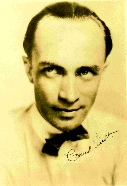
The Conrad Veidt Society
Just to be fair to Sinclair, his portrait of the pillars of society, as seen in Billy's dream, is not entirely vindictive. Some of the novel's most affectionately drawn characters include movie stars and an immensely wealthy, fat studio owner, and his equally plump wife, as well the narrator himself, Billy the club man. Billy is a perceptive, intelligent and ironic young fellow who sees quite clearly what is happening before his eyes. By the end, he is swayed by the force of Carpenter's message and magnetism and is completely in Carpenter's camp. Even so, he misunderstands Carpenter's intentions and goals, and his actions, which are meant to help Carpenter, only lead towards a dream Passion that ends on a completely disillusioned note.
Whether the power of Billy's dream will transform him in real life is left open to question. Even so, the end of ''They Call Me Carpenter'' is much less ambiguous than that of The Cabinet of Dr. Caligari, which teeters without resolution between fantasy and reality; Francis has been revealed as a madman, but the sets remain as tortured and distorted as before. ''They Call Me Carpenter'' nevertheless closes on its own note of irreality. ''And so I knew I was back in the real world,'' Billy says finally, but how real is anything in Hollywood?
For Conrad Veidt fans: sorry, no mention of Veidt himself, although there is a brief description of the plot of The Cabinet of Dr. Caligari.iu